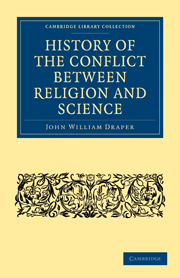Book contents
- Frontmatter
- Preface
- Contents
- CHAPTER I THE ORIGIN OF SCIENCE
- CHAPTER II THE ORIGIN OF CHRISTIANITY.—ITS TRANSFORMATION ON ATTAINING IMPERIAL POWER.—ITS RELATIONS TO SCIENCE
- CHAPTER III CONFLICT RESPECTING THE DOCTRINE OF THE UNITY OF GOD.—THE FIRST OR SOUTHERN REFORMATION
- CHAPTER IV THE RESTORATION OF SCIENCE IN THE SOUTH
- CHAPTER V CONFLICT RESPECTING THE NATURE OF THE SOUL.—DOCTRINE OF EMANATION AND ABSORPTION
- CHAPTER VI CONFLICT RESPECTING THE NATURE OF THE WORLD
- CHAPTER VII CONTROVERSY RESPECTING THE AGE OF THE EARTH
- CHAPTER VIII CONFLICT RESPECTING THE CRITERION OF TRUTH
- CHAPTER IX CONTROVERSY RESPECTING THE GOVERNMENT OF THE UNIVERSE
- CHAPTER X LATIN CHRISTIANITY IN RELATION TO MODERN CIVILIZATION
- CHAPTER XI SCIENCE IN RELATION TO MODERN CIVILIZATION
- CHAPTER XII THE IMPENDING CRISIS
- INDEX
CHAPTER III - CONFLICT RESPECTING THE DOCTRINE OF THE UNITY OF GOD.—THE FIRST OR SOUTHERN REFORMATION
Published online by Cambridge University Press: 29 August 2010
- Frontmatter
- Preface
- Contents
- CHAPTER I THE ORIGIN OF SCIENCE
- CHAPTER II THE ORIGIN OF CHRISTIANITY.—ITS TRANSFORMATION ON ATTAINING IMPERIAL POWER.—ITS RELATIONS TO SCIENCE
- CHAPTER III CONFLICT RESPECTING THE DOCTRINE OF THE UNITY OF GOD.—THE FIRST OR SOUTHERN REFORMATION
- CHAPTER IV THE RESTORATION OF SCIENCE IN THE SOUTH
- CHAPTER V CONFLICT RESPECTING THE NATURE OF THE SOUL.—DOCTRINE OF EMANATION AND ABSORPTION
- CHAPTER VI CONFLICT RESPECTING THE NATURE OF THE WORLD
- CHAPTER VII CONTROVERSY RESPECTING THE AGE OF THE EARTH
- CHAPTER VIII CONFLICT RESPECTING THE CRITERION OF TRUTH
- CHAPTER IX CONTROVERSY RESPECTING THE GOVERNMENT OF THE UNIVERSE
- CHAPTER X LATIN CHRISTIANITY IN RELATION TO MODERN CIVILIZATION
- CHAPTER XI SCIENCE IN RELATION TO MODERN CIVILIZATION
- CHAPTER XII THE IMPENDING CRISIS
- INDEX
Summary
The Egyptians insist on the introduction of the worship of the Virgin Mary.—They are resisted by Nestor, the Patriarch of Constantinople, but eventually, through their influence with the emperor, cause Nestor's exile and the dispersion of his followers.
Prelude to the Southern Reformation.—The Persian attack; its moral effects.
The Arabian Reformation.—Mohammed is brought in contact with the Nestorians.—He adopts and extends their principles, rejecting the worship of the Virgin, the doctrine of the Trinity, and every thing in opposition to the unity of God.—He extinguishes idolatry in Arabia, by force, and prepares to make war on the Roman Empire.—His successors conquer Syria, Egypt, Asia Minor, North Africa, Spain, and invade France.
As the result of this conflict, the doctrine of the unity of God was established in the greater part of the Roman Empire.—The cultivation of science was restored, and Christendom lost many of her most illustrious capitals, as Alexandria, Carthage, and, above all, Jerusalem.
The policy of the Byzantine court had given to primitive Christianity a paganized form, which it had spread over all the idolatrous populations constituting the empire. There had been an amalgamation of the two parties. Christianity had modified paganism, paganism had modified Christianity. The limits of this adulterated religion were the confines of the Roman Empire.
With this great extension there had come to the Christian party political influence and wealth. No insignificant portion of the vast public revenues found their way into the treasuries of the Church. As under such circumstances must ever be the case, there were many competitors for the spoils—men who, under the mask of zeal for the predominant faith, sought only the enjoyment of its emoluments.
- Type
- Chapter
- Information
- History of the Conflict between Religion and Science , pp. 68 - 101Publisher: Cambridge University PressPrint publication year: 2009First published in: 1875



